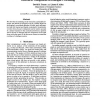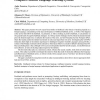1418 search results - page 249 / 284 » How to Explain Mistakes |
ACL
1994
13 years 9 months ago
1994
We show that in modeling social interaction, particularly dialogue, the attitude of obligation can be a useful adjunct to the popularly considered attitudes of belief, goal, and i...
COLING
1996
13 years 9 months ago
1996
A domain independent model is proposed for the automated interpretation of nominal compounds in English. This model is meant to account for productive rules of interpretation whic...
TLDI
2010
ACM
13 years 8 months ago
2010
ACM
Interactive programs, such as GUIs or spreadsheets, often maintain dependency information over dynamically-created networks of objects. That is, each imperative object tracks not ...
AIEDU
2007
13 years 8 months ago
2007
This paper presents two new corpus-based studies of feedback in the domain of teaching Spanish as a foreign language, concentrating on the type and frequency of different feedback ...
CORR
2010
Springer
13 years 8 months ago
2010
Springer
An answer to a query has a well-defined lineage expression (alternatively called how-provenance) that explains how the answer was derived. Recent work has also shown how to comput...


